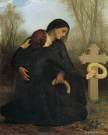
ALL SOULS, DAY (Commemoratio omnium fidelimm defunctorum) is the day set apart in the Catholic Church for the commemoration of the faithful departed. The celebration is based on the doctrine that the souls of the faithful which at death have not been cleansed from venial sins, or have not atoned for past transgressions, cannot attain the Beatific Vision, and that they may be helped to do so by prayer and by the sacrifice of the mass. The feast falls on the 2nd of November; or on the 3rd if the 2nd is a Sunday or a festival of the first class. The practice of setting apart a special day for intercession for certain of the faithful departed is of great antiquity; but the establishment of a feast of general intercession was in the lirst instance due to Odilo, abbot of Cluny (d. 1048). The legend connected with its foundation is given by Peter Damiani in his Life of St Odilo. According to this, a pilgrim returning from the Holy Land was cast by a storm on a desolate island where dwelt a hermit. From him he learned that amid the rocks was a chasm communicating with purgatory, from which rose perpetually the groans of tortured souls, the hermit asserting that he had also heard the demons complaining of the efficacy of the prayers of the faithful, and especially of the monks of Cluny, in rescuing their victims. On returning home the pilgrim hastened to inform the abbot of Cluny, who forthwith set apart the 2nd of November as a day of intercession on the part of his community for all the souls in purgatory.
The decree ordaining the celebration is printed in the Bollandist Acta Sanctorum (Saec. VI, pt. i. p. 585). From Cluny the custom spread to the other houses of the Cluniac order, was soon adopted in several dioceses in France, and spread thence throughout the Western Church. At the Reformation the celebration of All Souls’ Day was abolished in the Church of England, though it has been renewed in certain churches in connection with the “Catholic revival.” Among continental Protestants its tradition has been more tenaciously maintained. Even Luther’s influence was not sufficient to abolish its celebration in Saxony during his lifetime; and, though its ecclesiastical sanction lapsed before long even in the Lutheran Church, its memory survives strongly in popular custom. Just as it is the custom of French people, of all ranks and creeds, to decorate the graves of their dead on the jour des morts, so in Germany the people stream to the graveyards once a year with offerings of flowers.
Certain popular beliefs connected with All Souls’ Day are of pagan origin and immemorial antiquity. Thus the dead are believed by the peasantry of many Catholic countries to return to their former homes on All Souls’ Night and partake of the food of the living. In Tirol cakes are left for them on the table and the room kept warm for their comfort. In Brittany the people flock into the cemeteries at nightfall to kneel bare-headed at the graves of their loved ones, and to toll the hollow of the tombstone with holy water or to pour libations of milk upon it, and at bedtime the supper is left on the table for the soul’s refreshment.
Copyright © World Spirituality · All Rights Reserved